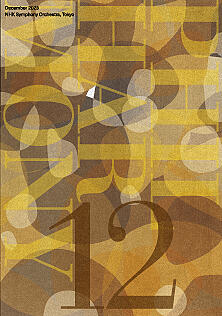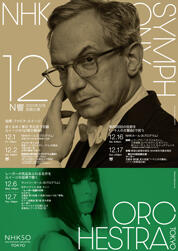- Home
- Concerts
- Subscription Concerts 2023-2024
- Program C
- No. 1998 Subscription (Program C)
No. 1998 Subscription (Program C)
NHK Hall
Google Map Seating Chart
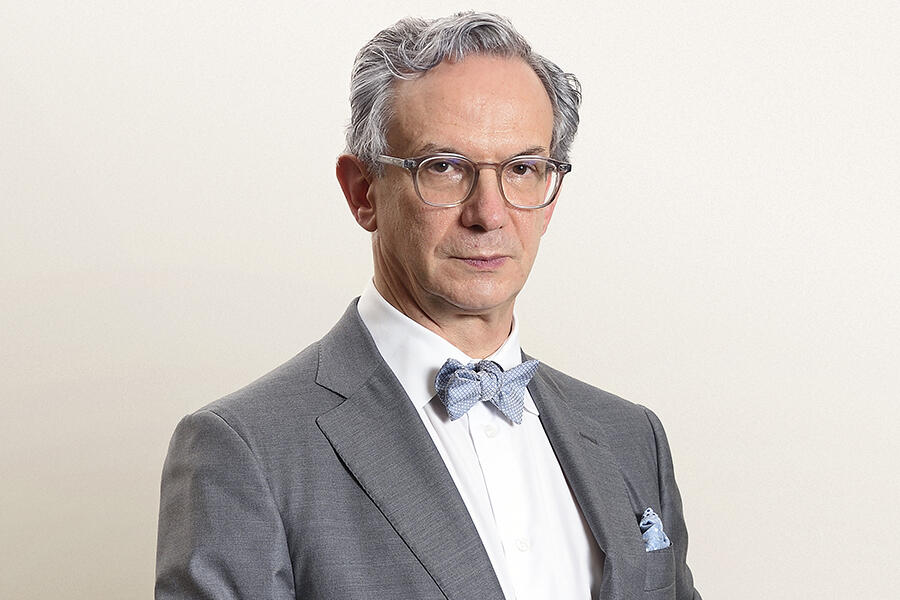
Program
Humperdinck / Hänsel und Gretel, opera—Prelude (Hansel and Gretel)
Humperdinck’s Hänsel und Gretel (Hansel and Gretel), like Beethoven’s Ninth symphony for Japanese concert goers and Tchaikovsky’s Nutcracker for North American families, is a December feature in German-speaking countries. One of the reasons is that the libretto by Humperdinck’s sister, an adaptation of the famous tale of the Brothers Grimm, embraces Christian elements of which the most noticeable is the fourteen angels’ pantomime (Act 2). Furthermore, this Christmas classic has no vicious stepmother nor cruel abandoning of her stepchildren unlike Grimm’s version: the title roles here, still in poverty, simply lose their way in the woods and do not frighten a young audience.
This “Märchenoper” (fairy-tale opera) was premiered in Weimar on December 23, 1893. While known for its inventive folk-inspired melodies, it shows influences of Richard Wagner (1813–1883) with its thick orchestration and effective utilization of leitmotifs (recurrent melodies associated with a certain character, emotion, etc.). Incidentally, Humperdinck had served as Wagner’s assistant in Bayreuth in 1881–1882 for preparing the premiere of the master’s Parsifal.
A delicious digest of Hänsel und Gretel, the Prelude is packed with leitmotifs used in the ensuing three acts. It begins gently with horns announcing the pietistic “Evening Prayer (or Benediction)” theme, while the following faster section starts with a trumpet fanfare derived from the “Witch’s Spell” theme. The “Prayer” theme plays an important role again during the peaceful close of the Prelude, just like in the opera’s cheerful happy ending.
[Kumiko Nishi]
Berlioz / Symphonie fantastique, Op. 14 (Fantastical Symphony)
Berlioz’s Symphonie fantastique (Fantastical Symphony) was premiered in Paris in 1830, only three years after Beethoven died. Back in 1828, the young man had heard the Classical titan’s Third and Fourth symphonies in Paris. The French romanticist recalled this electrifying experience later, writing “Beethoven opened before me a new world of music, as Shakespeare had revealed a new universe of poetry.” His Symphonie fantastique eventually “opened a new world” too, as a pivotal transition from the Classical symphony to the Romantic symphonic (tone) poem, a programmatic genre that Franz Liszt (1811–1886) would soon invent.
Symphonie fantastique is indeed programmatic, as the subtitle (“Episode in the Life of an Artist … in Five Sections”) and the program notes* penned by the composer clarify it. Moreover, it is autobiographical for “an Artist” is Berlioz himself who then had an obsessive one-sided love for the Irish Shakespearian actress Harriet Smithson (1800–1854). To depict the “fantastical” or even eccentric program, Berlioz employed a recurrent melody (representing the artist’s beloved) that he called “idée fixe” (fixed idea) foretelling Wagner’s above-mentioned leitmotifs. Also, Berlioz’s novel instrumentation under the influence of the operatic scoring was ideal for his fanciful drama.
I Rêveries (Reveries)– Passions has the pensive introduction followed by the faster section announcing the idée fixe on a flute and violins: the young protagonist falls in love with a dream woman at first sight. Sumptuous II Un bal (A Ball) is known for the first utilization of harps in the history of symphony, while pastoral III Scène aux champs (Scene in the Fields) supplies an ingenious acoustic perspective offering a dialogue between an on-stage English horn and an off-stage oboe. IV Marche au supplice (March to the Scaffold) lets the broken-hearted artist, overdosed on opium, dream of himself killing his beloved and thus being sent to the scaffold. Dead, he sees himself in his V Songe d’une nuit du sabbat (Dream of a Witches’ Sabbath) payed a visit to by the beloved’s spirit pictured by a grotesque idée fixe on a shrill clarinet sound. The backstage bells tolling the hero’s death precede the brassy, demoniac Dies irae (Day of Wrath) melody from the Catholic Mass for the Dead.
[Kumiko Nishi]
*This concert will have a duration of 60 to 80 minutes without an interval.
Artists
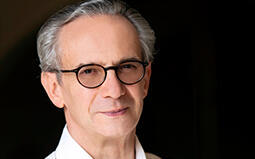 ConductorFabio Luisi
ConductorFabio Luisi
Fabio Luisi hails from Genoa. He is the Principal Conductor of the Danish National Symphony Orchestra and the Music Director of the Dallas Symphony Orchestra. He first conducted the NHK Symphony Orchestra in 2001, and in September 2022 he became Chief Conductor of the orchestra. In the 2022–23 season, his first season after assuming the post, Fabio Luisi conducted Verdi’s Requiem to commemorate his appointment in September. He has presented works of German and Austrian composers such as Beethoven, Brahms, Bruckner and R. Strauss as well as those of Franck and Saint-Saëns, Francophone composers, and with his conducting style full of passion and poetic sentiment, has captured the hearts of many of audience members. In August 2023, his tenure as Chief Conductor was extended by three years until August 2028.
He was General Music Director of the Opernhaus Zürich, Principal Conductor of the Metropolitan Opera in New York, Principal Conductor of the Wiener Symphoniker, as well as General Music Director of the Staatskapelle Dresden and the Sächsische Staatsoper, Artistic Director and Principal Conductor of the MDR Sinfonieorchester Leipzig, Music Director of the Orchestre de la Suisse Romande and Chief Conductor of the Tonkünstler Orchester. He is Music Director of the Festival della Valle d’Itria in Martina Franca (Apulia) and has appeared as guest conductor with numerous renowned ensembles, including the Philadelphia Orchestra, the Cleveland Orchestra, the Münchener Philharmoniker, the Filarmonica della Scala, the London Symphony Orchestra, the Royal Concertgebouw Orchestra, and the Saito Kinen Orchestra, while also conducting operas at world’s major opera houses. Important recordings include Verdi, Bellini, Schumann, Berlioz, Rachmaninov, Rimsky-Korsakov, Frank Martin, and Franz Schmidt, the largely forgotten Austrian composer. In addition, he has recorded various symphonic poems by Richard Strauss, and a lauded reading of Bruckner’s Symphony No. 9 with the Staatskapelle Dresden. His recordings of Wagner’s Siegfried and Götterdämmerung with the Metropolitan Opera won Grammy awards.
Pre-concert Chamber Music Performance
Pre-concert Chamber Music Performance
Program:Brahms / String Sextet No. 1 B flat Major Op. 18 - 2nd Mov.
Artists
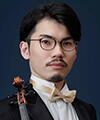
Ryuto Murao
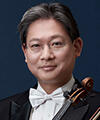
Hiroyuki Matsuda
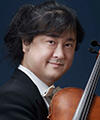
Junichiro Murakami
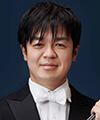
Ryo Muramatsu
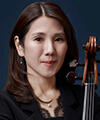
Masako Watanabe
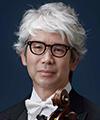
Shunsuke Fujimura
Download
Ticket
Program C
No. 1998 Subscription (Program C)
NHK Hall
Google Map
Seating Chart
Single Tickets Release Date
Pre-sales for Subscribers:Thursday, October 26, 2023
*about subscribers
Sale to General Public:Sunday, October 29, 2023
Price
| S | A | B | C | D | E | |
|---|---|---|---|---|---|---|
| Ordinary Ticket | 7,600 | 6,700 | 5,300 | 4,300 | 3,300 | 1,600 |
| Youth Ticket | 3,500 | 3,000 | 2,400 | 1,900 | 1,400 | 800 |
Seating chart Enlarge Print PDF
*tax included
*Subscribers receive a 10% discount (Available at NHKSO WEB Ticket and N-Kyo Guide)
*For wheelchair-accessible seats, please refer to the N-Kyo Guide
Youth Tickets
Youth Tickets are great options for those of 25 years old and younger
Subscription tickets
Release Date
ANNUAL SUBSCRIPTION TICKETS
Mon., July 17, 2023 10:00am
[For Subscribers: Sun., July 9, 2023 10:00am]
SEASONAL SUBSCRIPTION TICKETS (WINTER)
Tue., Oct. 17, 2023 10:00am
[For Subscribers: Thu., Oct. 12, 2023 10:00am]
Where to buy
NHKSO WEB Ticket | Friday, December 1 (In English / Seats not selectable)
NHKSO WEB Ticket | Saturday, December 2 (In English / Seats not selectable)
NHKSO WEB Ticket (In Japanese only / Seats selectable)
N-Kyo Guide (Purchase by telephone only)
Other Ticket Agents
Broadcast
 NHK-FMNo. 1998 Subscription (Program C)
NHK-FMNo. 1998 Subscription (Program C)
Friday, Dec 1, 2023 7:30PM - 9:10PM
Program:
Humperdinck / Hänsel und Gretel, opera—Prelude (Hansel and Gretel)
Berlioz / Symphonie fantastique, Op. 14 (Fantastical Symphony)
*This concert will have a duration of 60 to 80 minutes without an interval.
Conductor:Fabio Luisi
Recorded:December 1, 2023 NHK Hall
*Repertoire, conductor, soloists and program order are subject to change without notice.
*Pre-school children are not allowed in the concert hall

